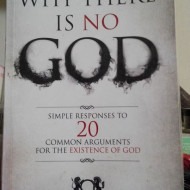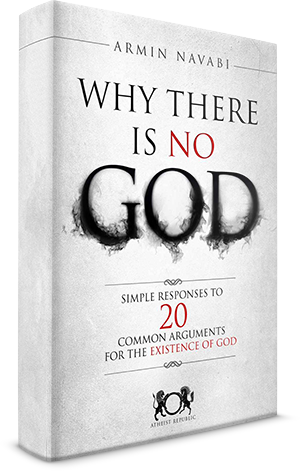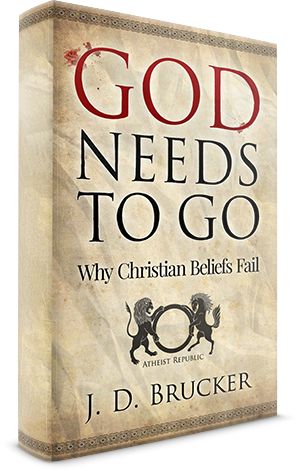
Rationale
I sat in the dimly lit dining room, pleasantly engaged in good company and even better conversation. The topic was Islamic dogma and my friend was Catholic.
“Yes, but it is their culture,” She pointed out.
“True, however, I have a problem with any religion that tries to force belief down my throat,” I said with indignation.
She too disliked this ghastly crime committed by almost every faith and so she replied, “I know, that is unbearable!”
I figured this was a sweet enough time as any, and attempted a final point, “And, it is not as if you go around thinking you’re right and they’re all wrong, do you?”
She paused for just a moment and then rather firmly stated, “No, I don’t think I’m right, I am right.”
The statement looks simple and reasonable enough. In fact, why would she commit herself to a belief if she didn’t believe it to be right? Yet, there is a sickly truth here, masquerading as innocence. Let us delve into the depths of this, shall I say, solipsism.
When she claims that she propitiates the one correct god, she is claiming that billions of people before her and with her are wrong. Alright, well, let’s not get all hot and bothered too quickly as this has been done before; for example, with heliocentrism and other scientific discoveries. What evidence does she have that her one particular form of monotheism is, indeed, the correct one?
Usually, but not always, the first piece of evidence given is the Bible. However, this is by far the weakest. The fact that people wrote about something does not make it true. If it worked that way, Hogwarts would be real – not only to my pleasant surprise but also many of my contemporaries. Even if you granted that it was a special piece of literature because it claims revealed or divine truths, she would still have to explain why the Rig Veda or the Koran are not just as true in proving their gods.
Another common bit of ecclesiastical evidence, and probably one of the more cliché ones, is the personal experience proof. It works for any and all religious or supernatural claims; therefore, it cannot be used to prove any one of them. Still though, we can take a closer look. They can range from seeing and hearing ghosts to, my favorite – a prayer, wish or spell “works”. We can begin with the latter. If it so happened that she wished for something and it came true and she started to feel as if there is something to this, she should stop and ask herself two questions. One, how many times have I wished for things before and they didn’t occur? Two, was my wish really more important than the billions of others? Even the ones struggling through starvation, degeneration, and deprivation? What about the child being tortured to death by disease or war? But no, her god is out granting wishes to safe, healthy, and, frankly, comparatively spoiled Americans. If so, she can have fun justifying that to herself morally. The people who claim to have seen apparitions, usually have dramatized and relived a mundane memory so many times that it becomes so distorted that even they become completely void of objectivity and honesty. The other portion are likely to have been cognitively impaired at the time, i.e. tired or hallucinating. The fact of the matter is that humans have had ways to observe, record, and test these ghost stories for over a century now. Through all of this documentation we still have no evidence to even slightly prove any of it.
The argument of design can simply be discarded by looking at the argument. It states, the Earth and the life on it is too complex to have occurred naturally; therefore, it must have been designed. If it is true that something complex cannot occur naturally, that it would need to have a designer, then the designer would be even more complex and would also need a designer. This is an infinite regress.
Pascal’s Wager, has undoubtedly been used by every theist to date. It states that you would be better off to believe in God than to not. Even if all the evidence suggests there isn’t a god. For if there is no god, nothing is going to happen when you die. However, if there is, and you didn’t believe, then you are going to hell. First off, I will not be bullied into believing anything and I can’t imagine a god that would be so petty to do so, but I’ll go more into that later. Secondly, how does she know which god is the right god to worship? How does she know that while she’s worshipping Yahweh she’s not making Thor progressively angrier?
“You can’t disprove God either!” Sure, I can’t disprove God, just like she can’t disprove unicorns. The fact that you can’t disprove something is not sufficient evidence to believe in it. Generally, in the U.S., people believe in some sort of God so they act like you are the one making the claim. So let me make this clear. If she is the one claiming something incorporeal, then it is incumbent on her to provide the evidence. If I claim that an invisible boogey man is in the backseat of her car, I would bear the burden of proof, not her. Like a theist, I could say, “Well, you can’t prove there is no invisible boogey man in your car.” And, it wouldn’t make it any more true.
I may be wrong, but I think that addresses most of the arguments for believing in God. I will next attempt to make the case that theism is morally lacking.
Morality
The wooden picket sign was starting to splinter the young girl’s hands, but she dare not lower it. It reads, “God Hates Fags”. Though her hands bleed and ache, she has a smile on her face. She knows that her parents would be proud that she is spreading the word of God. In the distance she hears the shouts of blasphemers and sinners. But over all of them she hears her father bellowing, “Homosexuality is a sin!” As his voice becomes louder and more ferocious, so too does her love for him, and Jesus.
How could someone brainwash a child into believing such abhorrent, insatiable, and vile beliefs? What would make a man so angry with a group of fellow primates who want nothing more than to love freely and openly? I want to engage in a conversation with you, and find out what is really causing this ignorance and hatred.
Theists are always going on about their morality; however, I have trouble seeing it. Where was the morality in the Crusades, inquisition, witch-hunts, 9-11, or countless other religious transgressions? Theists often respond, “Well, of course, you would bring those up.” As Stephen Fry once elegantly put it, “It’s a bit like a burglar in court saying, “Well you would bring up that burglary, and that manslaughter. You never mention the fact that I gave my father a birthday present.” Religion has undoubtedly caused a great amount of harm in the world and I will not have it passed off with a shrug of the shoulders, as if it were some tired complaint.
Circumcision is common in the modern age, but how did it become common? Think about it, you are sawing off part of the genitalia of a child! Is it not odd that it upsets us when theists do it to women, but when they do it to male babies it’s just what God commanded? How disgusting, and why on earth are we mutilating infants in this day and age!
After we have sawn off a part of their body we teach them to fear the God that they are supposed to love with the nasty story of Noah’s Ark. I was told this story as a child as if it was some fun children’s story. Essentially, God made flawed creations and then commands them to be perfect. Then, because they aren’t being perfect, he decides to ruthlessly murder every creature except the ones on the ark. What a petty and malicious God to go along with an already horrible story. It sounds like a capricious child playing with ants on a sidewalk. And, why do all of the other creatures on earth have to die for this God to murder the humans? Couldn’t the omnipotent one come up with a better plan for their extermination? If this were true then the God of the bible would be worse than Hitler, in that he committed mass genocides so that he could breed his ultimate race. His prejudice, jealousy, and mistake in creation shows that this God would certainly not be omniscient or omnipotent. The God of the Bible also had no quarrel with slavery. As a matter of fact, he supported it and instructed one on how to attain, hold, and treat their slaves.
People are always saying that those who don’t believe in God can’t be moral. I, however, can’t see how theists can be moral. The God of the Bible says multiple times to kill homosexuals, fornicators, non-believers, adulterers, disobeying children, people of other religions, and anyone who works on the Sabbath. So my question to them is why, if they’re not going to follow the word of their God, are they worshipping him? Why not subscribe to a more peaceful and loving belief system?
I believe Steven Weinberg put it best when he said, “With or without religion, you would have good people doing good things and evil people doing evil things. But for good people to do evil things, that takes religion.” In essence, he is saying that decent people will still commit good deeds and evil people will still commit evil deeds. However, a good person, when told not to question and to just have faith in something can be coerced into doing something evil. For example, when someone commits suicide or genocide to get into their brand of paradise. If they weren’t under the spell of religious fervor, do you really think they would do this?
Imagine, for a moment, that you live in a different country and are the descendent of a rebellious tribe who resisted the rule of a dictator. Because your ancestors rebelled, you must pay for the crime even though you had nothing to do with it. This dictator tells you what you can eat and on which days you can eat it. How you can love and who you can love. He tells you that you must submit to him before every meal and every night before bed. He tells you that he is infallible, omnipotent, and omniscient. But, above all, he loves you and you should love him. If you disobey or do not submit to him, you will be tortured for the rest of your life. However, if you follow the rules you will be just fine. Now, what would you say if I told you that I don’t think you could act morally if you didn’t live in a society like this? This is how it sounds when a theist says that I cannot be moral if I don’t believe in their specific version of the “Dictator”. What an absurd statement. It is insulting to me and it should also be insulting to you. I sincerely hope that you are not being a villain just because your deity told you not to.
I hope that I have, at the least, given you an outside perspective of what the theistic world looks like to the irreligious. I would like to make an emotional appeal for God now, because I just cannot see a logical or ethical one.
Why one might believe in God
The most powerful incentive to being a theist is the comfort of thinking you’ll live forever. Above all, humans throughout history have been afraid of death. The added pleasures of going to a place after you die where you will see and be with your family is also very tempting (for some people). For many though, it is almost impossible to give up their religion. Their life, culture, and family are just so intertwined with it. I know quite a few people who are of this bunch, they don’t actually believe it anymore but they know it is important to their family. Historically, religion has also inspired some of the most beautiful creations through art. And I would never want anything of the culture, history, or art to be molested by destructive forces. It is much like how I still absolutely love Christmas – yes, Christmas is amazing. How could an Atheist love Christmas? The very same way that you love Halloween or the Tooth Fairy. You don’t actually believe those things are real, but they are fun, and part of our culture!
I derive my ethics and worldviews from great philosophers, authors, and scientists. Most importantly though, I don’t just accept what I am told. If I am told some new idea or philosophical concept, I will think it through for myself. And, if I find flaws in it, I will not annex it. There is something to be said for thinking for yourself. I pity the people who ignorantly submit to nasty bronze-age myths just because they were raised that way. For, as Christopher Hitchens said, “Take the risk of thinking for yourself, much more happiness, truth, beauty, and wisdom will come to you that way.”





























